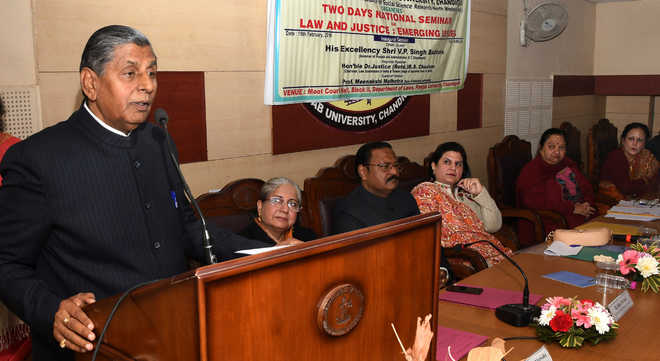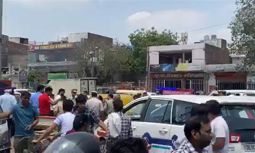
Justice (retd) BS Chauhan, Chairman, Law Commission of India, addresses a seminar at the Department of Laws, PU, Chandigarh, on Thursday. TRIBUNE PHOTO: NITIN MITTAL
Tribune News Service
Chandigarh, February 15
Reservation is a part of social development. It was initially given in jobs and legislature for 10 years, but now it has been extended to various other spheres.
This was stated by Law Commission Chairperson Justice BS Chauhan (retd) while addressing a two-day seminar ‘Law and Justice: Emerging Issues’ at Panjab University here today.
He said the courts had always been repeating that reservation was not a fundamental right.
“When states grant the reservations, enforcing Article 335 should be kept in mind,” he said. The Article 335 says the claims of the members of the Scheduled Castes and the Scheduled Tribes shall be taken into consideration, consistently with the maintenance of efficiency of administration, in the making of appointments to services and posts in connection with the affairs of the Union or of a State, he says.
Uniform Civil Code
Speaking on the Uniform Civil Code, which the commission has been studying, Chauhan said no one questioned Britishers why did they ignore Islamic law when they codified and unified laws, such as the Indian Penal Code, Code of Criminal Prodecure, in India. The Muslim Personal Law Application Act came in 1937.
“Dr BR Ambedkar wanted Uniform Civil Code should be voluntary in the initial phase and Parliament could enact the law later. The Supreme Court said it (Muslim Personal Law) was violating Article 14 (equality before law) and 15 (prohibition of discrimination on grounds of religion, race, caste, sex or place of birth) of the Constitution.”
“The biggest obstacle in the Uniform Civil Code is the special benefits extended to the north-east,” he said and cited Bordoloi Committee recommendations which mentioned that “people in the north-east did not understand the law and there was political instability also. Hence, protection should be given”. Gopinath Bordoloi later became the CM of Assam. “Central laws are not applicable there. Section 1 of the CPC (Code of Civil Procedure) says it is not applicable in the tribal areas,” said Chauhan.



























